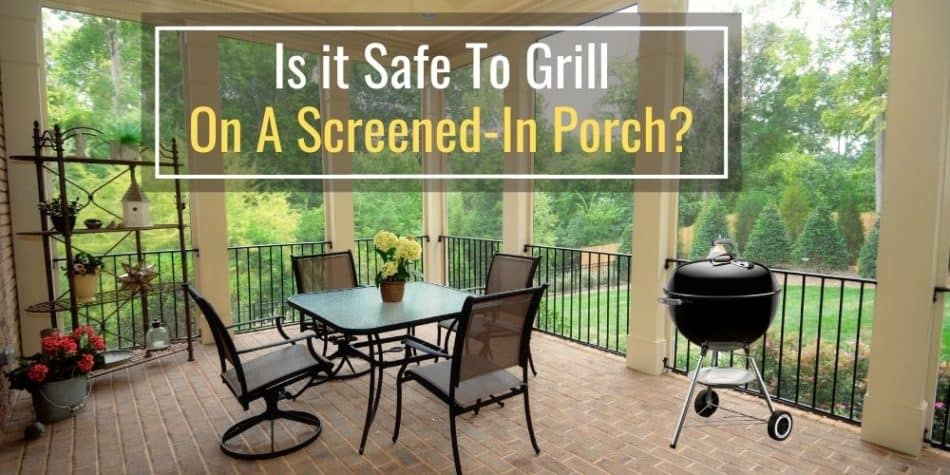As the summer fades away and fall and winter months roll in, a common desire I get is to keep grilling.
However, rain and snow can make outdoor grilling impossible or unenjoyable. There are ways to grill under a covered area such as a covered deck, gazebo, or carport.
A common question I hear is if it’s possible to grill on a screened-in porch?
Generally, grilling in a screened-in porch is only recommended with an indoor electric grill. Charcoal, gas, and pellet grills will create too much smoke to be safely used in most screened-in porches.
The two most important factors to consider when attempting to grill under a covered area are to make sure that there is sufficient airflow and that the grill will not start an uncontrolled fire.
Generally, most screened-in porches do not have enough airflow to blow out the smoke and the screened-in walls create another layer of risk since they will also hold in the heat from the grill.
Now let’s dive into each of the reasons for and against grilling on a screened-in porch.
Reasons To Not Grill On A Screened-in Porch
Despite being perfect places to sit and enjoy some time together as you have tantalizing meals, screened-in porches are not a good location for grilling.
Considering a screened-in porch is an enclosed space, all grills besides electric grills should not be used in an enclosed space.
Here are some of the main reasons why you never want to grill on a screened-in porch:
1. Fire Concerns
A majority of screened-in porches are made of wood and have a wooden roof.
The combination of grilling inside of an enclosed space that is made of wood is a major fire hazard.
If you grill on your screened-in porch, you might have to deal with flareups as well as embers which are well-known fire hazards.
The fire risk of grilling on a screen-in porch is too high given how flammable porches can be.
2. Carbon Monoxide Danger
Another reason why you should not grill on a screened-in porch is the threat of carbon monoxide poisoning.
Charcoal, gas, and pellet grills all produce carbon monoxide as well as smoke.
Carbon monoxide poisoning can have deadly effects in enclosed spaces when there is not enough airflow to allow the carbon monoxide to safely vent away.
So the risk of carbon monoxide poisoning is another reason to not grill on a screened-in porch.
3. Toxic Fumes
The smoke given off by burning charcoal or wood has a lot of toxic chemicals which are not good for anyone’s health, especially when you breathe in the fumes over a long period of time.
Even though you might not experience the side effects of breathing in these toxic fumes immediately, they can accumulate over time and cause some serious health problems.
Once again, grills need sufficient airflow to blow away the toxic fumes in order to be safely used.
4. Staining The Porch
If you’re grilling on a screened-in porch, there’s a good chance that you will end up staining it with grease, food particles, and other grill marks. Once these stains set in, they can be quite difficult to remove.
In addition, if your roof is not high enough, the heat from the grill might be so intense that it can create marks and discoloration.
Not to mention if your screen is made of synthetic plastic, you can expect the heat to begin to warp or even melt the plastic.
So the heat and smoke from the grill can cause serious issues on a screen-in porch.
5. Smoke Damage
The smoke that comes off grilling will rest on different surfaces around the porch, including the ceiling.
This can cause immediate or eventual damage to the materials on your porch. Even though the smoke will probably not kill you, it will leave your screened-in porch smelling like smoke for a long time.
Similar to how smoking indoors can leave a car or home smelling like smoke well after someone stops smoking a cigarette, grilling in an enclosed space can leave a smoky smell for well after the grill has been turned off.
6. Breaking Local Rules And Regulations
A majority of regions have rules and regulations that focus on barbecuing and grilling.
Grilling in enclosed spaces is often prohibited and for good reasons.
If you grill on your screened-in porch and happen to live in an area with strict regulations, you might be at risk of receiving a fine.
Better Alternatives To Grilling On Screened-in Porches
So what can you do if you want to grill but don’t want to risk damaging your screened-in porch?
1. Install A Barbecue Island
Barbecue islands are often placed in a location that has adequate airflow and will be fire resistant to any stray embers or flare-ups.
Not to mention some barbecue islands have roofs that will protect yourself and your guests from the sun and rain.
Although barbecue islands can be pricey to build and install, they will create a great outdoor space dedicated to grilling all year round.
2. Grill In An Open Space
An alternative to grilling on a screened-in porch is to do it in an open space.
This can be either in your yard or at a park. If you choose to grill in your yard, make sure that there is plenty of distance between the grill and your house as well as any other structures.
It’s also a good idea to re-design your yard so that you have a paved area that is dedicated to grilling. You can also get a deck mat or grill mat for your grill.
While this is not an essential accessory, it does a good job of helping you maintain the cleanliness of your outdoor grilling space. In addition, a good grill mat should help you lengthen the lifespan of your deck.
Keep in mind that it is possible to grill underneath a covered area as long as there is enough vertical clearance so that the smoke and heat do not damage the structure the grill is placed under.
Make sure there is enough airflow so that the smoke can safely blow away from the covered area.
3. Use An Indoor Grill
Last but not least, another option is to use an indoor grill.
Indoor grills work just like outdoor ones, the only difference being that they are powered by electricity. This means you’ll have to plug them into a power source and make sure they don’t catch fire or cause any other damage.
An added benefit of using an indoor grill is that you can use it all year round. So, even if you live in an area where barbecuing is not possible during fall and winter, you won’t have to deal with this inconvenience.
The only downside to using indoor grills is that they often lack the same cooking options as outdoor grills. They tend to be rather small which means you’ll be limited in terms of what you can cook and how much at a time.
In addition, due to the way that indoor grills are designed, they don’t cook like outdoor grills and in most cases, the food might not taste as good.
However, indoor electric grills can satisfy that grilling itch when the weather outside doesn’t cooperate with your grilling plans.
Final Thoughts
Grilling in a screened-in porch is not a safe or advisable option. There are many other ways to grill without having to take the risks associated with grilling on a screened-in porch.
By using one of the alternatives listed in this article, you will not only have fun preparing tasty food for your family and friends but you’ll also get to actually sit down, relax and enjoy your grilled food.
That’s all for this topic. Be sure to stay tuned for more helpful articles on grilling!

